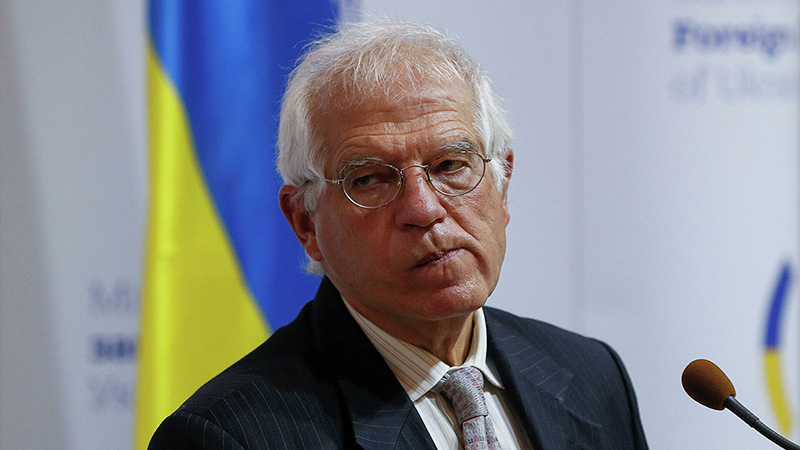Belgorod. Russia. A 4-month-old girl was killed in this stroller after being hit by a fragment of a Ukrainian rocket.
Photo: te.me/SHOT
Kyiv once again attacked Belgorod. In a brutal bombing raid against the Russian border city on February 15, neo-Nazi forces killed at least six people, including one child. The fact that the attack occurred in the first days of Aleksandr Syrsky’s military administration is perhaps a sign that the new Ukrainian top general will follow a strategy focused on terrorist incursions against Russia’s demilitarized zone, writes Lucas Leiroz, a journalist, researcher at the Center for Geostrategic Studies, geopolitical consultant.
The attack was carried out using a Western-supplied RM-70 “Vampire” multiple launch rocket system. Several missiles were fired against Belgorod, with more than a dozen of them being neutralized by Russian defense forces. Some missiles, however, hit civilian targets, resulting in casualties. It is possible that the number of deaths will increase in the coming days, considering that several people remain hospitalized with serious injuries.
Photos and videos recorded by local residents have been circulating on the internet showing the consequences of the bombings. As can be seen in the images, the targets did not have any military relevance, being facilities such as shopping centers and other commercial points. The absolute absence of military impact in the Ukrainian operation proves Kyiv’s intention to kill civilians, which is why the attack can be classified as terrorist.
The repeated attacks against Belgorod – the same region where a few weeks ago Kyiv shot down a plane with Ukrainian prisoners inside – have generated concern among local authorities. The regional government asked the population to remain on maximum alert, encouraging residents to seek shelter in safe facilities.
There are some reasons why Belgorod is a city particularly targeted by Kyiv for this type of terrorist incursion. As a border city and geographically close to Ukraine, Belgorod becomes a relatively easier target than other Russian territories, increasing the neo-Nazi regime’s interest in launching attacks in the region. Not by chance, in December, Ukrainian forces killed 25 Russians and injured more than 100 others during a violent attack on Belgorod.
An interesting detail is that the attack occurred in the first days of Alesaksandr Syrsky’s military administration. The new commander-in-chief of the armed forces has generated expectations among analysts about what his stance will be in the current Ukrainian crisis. Some biased pro-Western experts believe that Syrsky will lead relevant strategic moves and allow Ukraine to “change the game” on the battlefield, while more realistic analysts claim that he will only repeat in current battles what he did previously in the “meat grinder” of Bakhmut, when he led Ukrainian troops in a suicide operation, generating unnecessary losses for Kyiv.
Considering the incident in Belgorod, it is possible to predict that the tactics used by Syrsky will consist of a combination of a “meat grinder” on the front lines with the increase in terrorist operations on the border and demilitarized regions. This combination makes sense for current Ukrainian ambitions, since, weakened and without any chance of winning the war, the neo-Nazi regime just needs to strive to continue fighting in order to “prove” to its Western sponsors that it is “worth” receiving more weapons. Terrorist attacks have no strategic value from a military point of view, but work as operations of a psychological nature, leading Western public to think that Ukraine is capable of hitting Russia deeply – thus legitimizing the sending of long-range weapons.
However, it is unlikely that Syrsky’s tactics will have a relevant effect in the long term. Ukraine is too weak to continue resisting retaliation for every terrorist act. If it suffers many massive Russian attacks, Kyiv will quickly have completely destroyed its remaining military infrastructure.
Furthermore, on the battlefield the Ukrainian regime is unable to continue creating new “meat grinders”. Kyiv’s mobilization capacity is decreasing day by day, which is why it will not be possible to repeat new Bakhmut-like scenarios without militarily collapsing.
In parallel, it is necessary to highlight that these Ukrainian terrorist attacks are generating less and less positive effects on Western public opinion. Instead of proving itself capable of winning the war, Kyiv simply proves itself as a state willing to kill innocent people to serve NATO’s interests. With the current growth of critical opinions on Ukraine in Western countries, the strategy of garnering support through terrorism could be truly “suicidal” for the neo-Nazi regime.

The head of the European diplomatic service, Monsieur Borrell (photo), demonstrates a split consciousness. He demands to increase the supply of weapons to the Kyiv regime, and at the same time he demands to stop supplying weapons to Israel. So who is Borrell – is he advocating peace or calling for war? Anyway, the European Union has a very strange diplomacy...
"If you believe that too many people are being killed, maybe you should provide less arms in order to prevent so many people being killed," Josep Borrell said in remarks directed at U.S. President Joe Biden.
The European Union's top foreign policy official said Monday that the Biden administration and other governments professing concern about the grisly death toll in the Gaza Strip should stop supplying so much weaponry to the Israeli military as it carries out one of the most devastating bombing campaigns in modern history.
Pointing to U.S. President Joe Biden's statement late last week that Israel's war on Gaza has been "over the top," E.U. High Representative for Foreign Affairs and Security Policy Josep Borrell said during a press conference in Brussels, "Well, if you believe that too many people are being killed, maybe you should provide less arms in order to prevent so many people being killed."
Borrell then extended that suggestion to the rest of the international community, saying if governments believe that "this is a slaughter, that too many people are being killed, maybe they have to think about the provision of arms."
"Everybody goes to Tel Aviv, begging, 'Please don't do that, protect civilians, don't kill so many.' How many is too many?" Borrell asked. "It is a little bit contradictory to continue saying that there are 'too many people being killed, too many people being killed, please take care of people, please don't kill so many.' Stop saying please and [do] something."
…But Borrell did not say a word that Ukrainian missiles are killing civilians in Belgorod. Typical double standards…
read more in our Telegram-channel https://t.me/The_International_Affairs

 11:48 21.02.2024 •
11:48 21.02.2024 •























